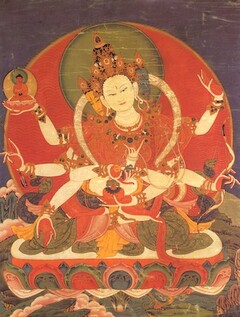Praise of Uṣṇīṣavijayā
Praise of Uṣṇīṣavijayā
by Jamyang Khyentse Chökyi Lodrö
Oṃ svasti!
Praise to the blessed conqueror,
Who arose from the Tathāgata’s uṣṇīṣa,
Three-faced, eight-armed, with a peaceful smile,
Supreme goddess of boundless wisdom.
The instant we visualize your sublime form
And recite the sovereign of vidyā-mantras,
Even the wrathful Yama, Lord of Death,
Is compelled to turn and flee far away.
It is by venerating and relying upon you
That the multitudes of tathāgatas,
Bodhisattvas, sages and vidyādharas
Become great masters of the ten powers.
If now, in just the same way,
We praise you with intense devotion,
Pray, grant us the supreme siddhi
Of immortal life and pristine wisdom.
Thus, although these praises
To the three sublime deities[1]
Lack the elegance of poetic
Turns of phrase, nevertheless
At the request of a faithful student,
I, the one called Chökyi Lodrö,
Spoke these words while travelling
By boat in the middle of the Ganges
In the noble land of India,
And, accordingly, Lodrö Chokden[2]
Wrote them all down.
May the splendour of virtue, excellence and longevity
Increase just like the River Gaṅga’s flow.
Sarva maṅgalam.
| Translated by Adam Pearcey with the generous support of the Khyentse Foundation and Tertön Sogyal Trust, 2023.
Bibliography
Tibetan Editions
'jam dbyangs chos kyi blo gros. "gtsug tor rnam par rgyal ma la bstod pa/" In 'jam dbyangs chos kyi blo gros kyi gsung 'bum. 12 vols. Bir, H.P.: Khyentse Labrang, 2012. (BDRC W1KG12986). Vol. 2: 467–468
blo gros mchog ldan (sic). “gtsug tor rnam par rgyal ma la bstod pa.” In mkha' 'gro’i chos mdzod chen mo. 53 vols. Lhasa: Bod ljongs bod yig dpe rnying dpe skrun khang, 2017. Vol. 50: 32
Version: 1.0-20230314
-
This colophon follows three separate praises to the three deities of long life: White Tārā, White Amitāyus and Uṣṇīṣavijayā, all composed at the same time. Of these, the Ḍākinī Treasury collection selected only the third. ↩
-
The Ḍākinī Treasury edition misattributes the text to Lodrö Chokden, who was merely the scribe. ↩
